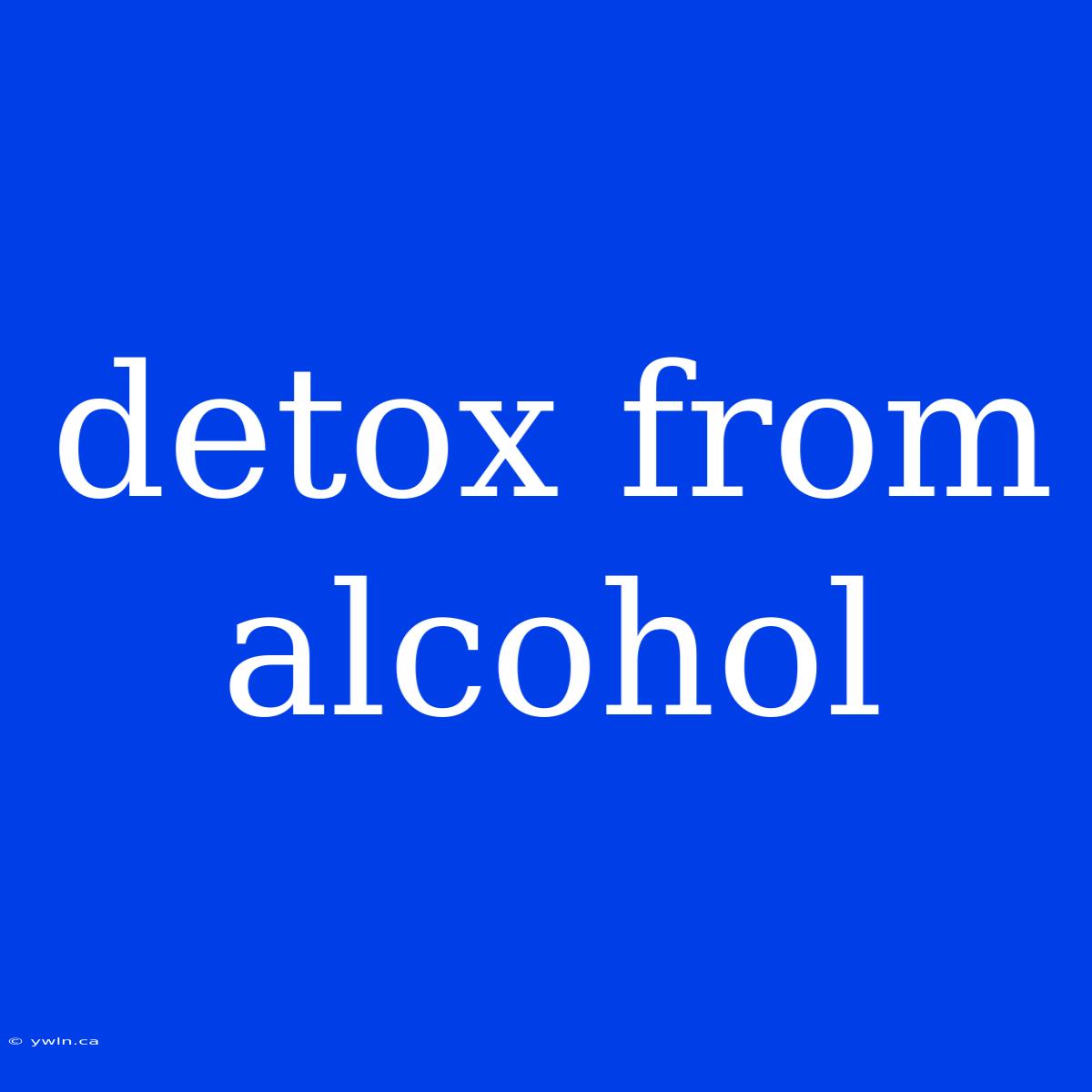Detoxing from Alcohol: A Guide to Understanding and Managing the Process
Detoxing from alcohol is a crucial step in recovery for many individuals struggling with alcohol use disorder. Alcohol withdrawal can be dangerous and potentially life-threatening, requiring professional medical supervision. This guide will explore the complexities of alcohol detox, providing essential information for those seeking help or supporting someone going through this process. Editor Note: This comprehensive guide on alcohol detox is vital for anyone involved in or supporting alcohol addiction recovery. Understand the dangers and nuances of detox to ensure safety and better outcomes.
Understanding Alcohol Detox
Alcohol detox involves withdrawing from alcohol entirely and allowing the body to regain its natural balance. This process can be challenging as the body becomes dependent on alcohol, leading to withdrawal symptoms when alcohol intake ceases. Understanding the nuances of alcohol detox is crucial for a safe and successful recovery.
Key Aspects of Alcohol Detox:
| Aspect | Description |
|---|---|
| Withdrawal Symptoms | Physical and psychological reactions experienced during detox, ranging from mild to severe. |
| Severity and Duration | Varies depending on the individual's drinking history, age, overall health, and other factors. |
| Medical Supervision | Crucial for managing withdrawal symptoms and preventing complications. |
| Detoxification Methods | Involve gradual alcohol reduction, medications, and supportive care. |
| Relapse Prevention | Strategies to avoid returning to alcohol use after detox. |
Alcohol Withdrawal Symptoms:
Alcohol withdrawal symptoms can be severe and debilitating, and they typically begin within a few hours of the last drink. Common symptoms include:
- Shaking (tremors)
- Sweating
- Nausea and vomiting
- Headache
- Anxiety and agitation
- Insomnia
- Seizures
- Delirium tremens (DTs) - a life-threatening complication characterized by confusion, hallucinations, and fever
Medical Supervision:
Medical supervision during alcohol detox is essential to manage withdrawal symptoms and prevent complications. Healthcare professionals can:
- Monitor vital signs
- Administer medications to alleviate withdrawal symptoms and reduce the risk of seizures
- Provide supportive care
- Develop an individualized detox plan
Detoxification Methods:
Detoxification methods vary depending on the individual's needs and severity of their withdrawal symptoms. Common approaches include:
- Gradual alcohol reduction: A gradual reduction in alcohol intake under medical supervision.
- Medications: Benzodiazepines are often used to manage anxiety and reduce seizure risk.
- Supportive care: Includes therapy, counseling, and group support.
Relapse Prevention:
Relapse prevention is a critical component of alcohol detox and subsequent recovery. Strategies include:
- Continuing therapy and counseling
- Joining support groups like Alcoholics Anonymous (AA)
- Developing a strong support system
- Learning coping mechanisms for stress and cravings
FAQs About Alcohol Detox:
-
Q: Is alcohol detox painful?
A: Alcohol detox can be uncomfortable and even painful, especially if the individual has a history of heavy drinking.
-
Q: How long does alcohol detox last?
A: The duration varies depending on the individual, but it typically lasts from a few days to a week or more.
-
Q: Can I detox at home?
A: It is not recommended to detox at home without professional medical supervision, as it can be dangerous.
-
Q: What are the long-term effects of alcohol withdrawal?
A: Long-term effects can include anxiety, depression, sleep problems, and cognitive impairment.
-
Q: Can alcohol withdrawal be fatal?
A: Yes, alcohol withdrawal can be fatal if not managed properly.
-
Q: What are some signs that I need to seek help for alcohol detox?
A: Signs include experiencing severe withdrawal symptoms, having a history of alcohol dependence, or feeling unable to stop drinking on your own.
Tips for Successful Alcohol Detox:
- Seek professional help: A healthcare provider can assess your needs and create a safe detox plan.
- Be patient and understanding: Detox takes time and effort.
- Stick to your treatment plan: Follow the instructions given by your healthcare provider.
- Stay hydrated: Drink plenty of fluids to help flush out toxins.
- Get enough rest: Rest is essential for healing.
- Build a strong support system: Seek support from family, friends, or a therapist.
Summary: A Roadmap to Recovery
Successfully navigating alcohol detox is a significant step toward a healthier future. Understanding the process, seeking professional help, and maintaining a strong support system are crucial to overcoming alcohol dependence and achieving lasting sobriety.
Remember: You are not alone. Help is available, and recovery is possible.

